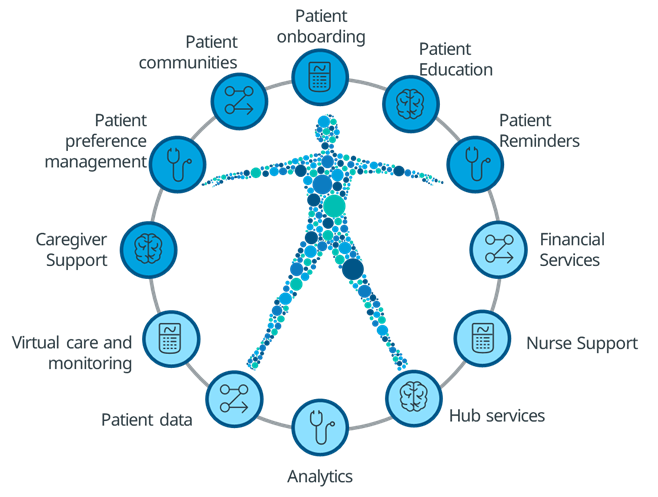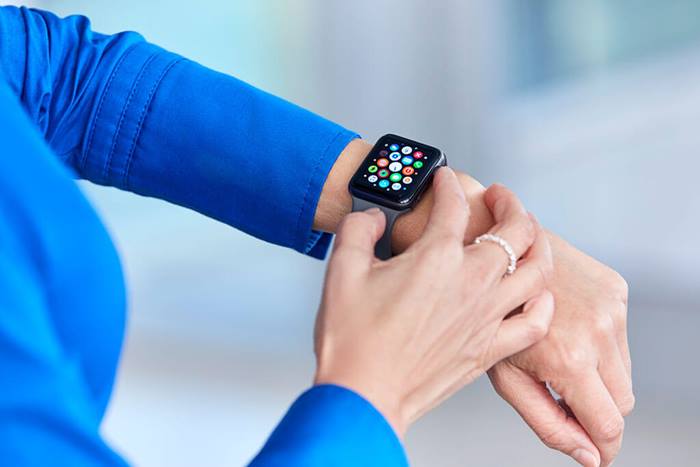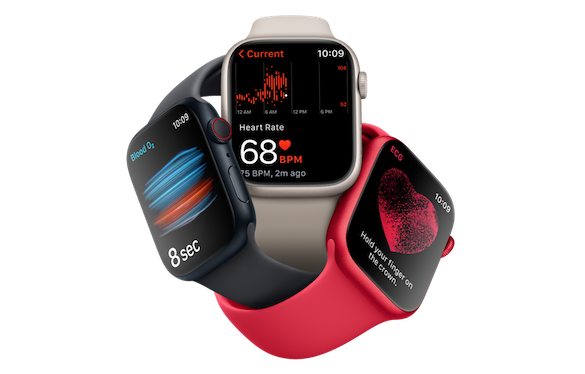Effectively engage with patients to help improve adherence, drive better disease understanding, and deliver treatment value.
With wearables like the Apple Watch making a transformative impact on healthcare, their potential for reimagining the patient experience is truly exciting. In a digital healthcare environment, support is integrated into the patient’s daily life and allows for real-time access; education is personalized with adaptive and reactive support for each individual; and ubiquitous, instantly available data leads to more intelligent and timely decision-making.
Delivering better patient outcomes by improving the patient experience
Apple Watch and other wearable health monitors are accelerating the evolution of the patient experience and enabling new capabilities for pharma/biopharma developers. Where patient engagement and support has traditionally been high-touch (support and/or nursing provided at the patient’s home or via an in-clinic visit), today’s digital patient experience enables highly integrated virtual support. This new approach engages patients across a wider range of interactions and complements in-person interaction with remote support and consultations.
For patients, this digitally enhanced approach follows the shift away from generic patient education and one-size-fits-all content delivered via static, print-based materials. Instead, patients receive personalized education that offers tailored, reactive and adaptive support across multiple channels and delivers dynamic, actionable, interactive and rich digital content.
This shift is primarily enabled by better data: Under the traditional model, data was limited or siloed (if available at all), and was often stuck in multiple platforms stored in a mixture of structured and unstructured data. In contrast, today’s digital approach focuses on intelligent data aggregated from multiple sources and is instantly available.
The impacts of this evolution of the patient experience are significant, including:
- Greater engagement and more efficient use of resources
- Increased efficacy with education and intervention that meets changing patient needs
- Informed, data-driven decisions and connections for better outcomes management
Ultimately, IQVIA Patient Experience Solutions powered by Apple enable digital patient support programs (PSPs) to leverage an ecosystem familiar to the patient (and require minimal effort) in order to deliver digital interventions. This new patient experience helps improve operational program KPIs, as well as patient clinical outcomes and satisfaction measures.
The game-changing impact of IQVIA’s collaboration with Apple
Combining IQVIA’s market-leading data analytics with Apple’s best-in-class technology transforms patient experiences and better serves patient needs. IQVIA Connected Intelligence™ links traditional IQVIA data, advanced analytics, and healthcare expertise with the industry-leading capabilities and simplicity of the Apple HealthKit ecosystem to create a step-change in the patient experience.
This improvement starts with data collection, including:
- Data collected passively (e.g., activity, health metrics, allergy data, weather)
- Data from the patient’s electronic health records (EHR)
- Data from IQVIA and other data sources
- Data collected actively (e.g., self-reported adherence data, self-reported exercise)
Importantly, all this activity is at the patient’s discretion. Putting the patient in charge of what data is collected, how and with whom it is shared, and what level of interaction is acceptable are all features of Apple HealthKit. Apple is well known for keeping user data secure and protecting user privacy – capabilities that mirror IQVIA’s own commitment to patient privacy.
After the patient has opted in, IQVIA ingests, aggregates, stores and analyzes all available data to create actionable insights that are highly relevant across patient engagement and condition management, as shown in Figure 1.
Figure 1: Services across patient engagement & condition management

In particular, real-time passive data collection can enable hyper-personalized insights and influence dynamic support that changes and adapts based on those insights. For patients, benefits include:
- Tailor-made support: The patient shares information that they choose and receives personalized support through their preferred medium and format.
- Accessible insights: Individual insights about health conditions or treatment plans are available via everyday devices. Convenient recording of patient-reported outcomes (PROs) further improves awareness of disease, symptoms, triggers and management, and can be used to generate personalized notifications.
- Disease management: Patients can manage their conditions through the use of a single device while personalized content encourages self-management behaviors and achievement of goals.
Pharmaceutical companies and other health stakeholders also enjoy a range of benefits and new opportunities, including:
- Increased program uptake and engagement: The use of devices that patients already own makes uptake and engagement levels rise.
- Improved adherence and persistence: Unparalleled access to insights, combined with behavioral science techniques and personalization, can unlock higher levels of condition management, including the ability to build personal health baselines and to engage with patients via behavioral nudges/alerts.
- Ability to generate evidence and measure outcomes: Real-world evidence and insights can demonstrate the value of interventions and identify the return on program objectives. The ability to collect passive data and PROs helps support outcomes/value measurements and the development of learning health systems.
- Enhanced analytics and risk profiling: A better patient journey and segmentation models help identify and engage key populations, address disease treatment paradigms and inform the design and delivery of future programs.
Possible solutions and applications (present and future)
IQVIA Patient Experience Solutions powered by Apple create a paradigm shift that will impact well beyond a single solution or use case. This collaboration enables a range of possibilities, from digital patient support programs and prevention programs to real-world evidence generation programs (observational studies).
At this early stage, digital PSPs are one of the key drivers. PSPs are key to helping patients use their medications, and in recent years these programs have relied on virtual solutions (video calls, automated reminders, etc.) to meet that objective. But that is only the beginning — the future of PSPs is to leverage wearables to capture patient data and enable even more significant digital interventions.
While all this data and analysis lends itself to measuring real-time vital signs and identifying key outcomes in the moment, there is also long-term value in tracking the data over time. Building detailed histories is significantly easier, and more likely to succeed, with technologies like Apple HealthKit that passively gather patient data. Pharmaceutical companies with access to this granular level of real-world data will be able to uncover previously obscure connections and identify new avenues of inquiry. The possibilities are endless.


























